Commentary: Singapore’s take-up rate for breast cancer screening is low but we can involve youths to change this

Breast cancer is the most common cancer afflicting women globally, with no less than one in eight women expected to develop the disease in their lifetime.
As a breast surgeon at Khoo Teck Puat Hospital, I see six to eight cases of newly diagnosed breast cancer patients every week.
But it is no less difficult to break the bad news of metastasis — or the spread of cancer — to my patients and their loved ones.
It can be especially hard when it hits the young. Just recently, a colleague of mine lost his wife to breast cancer.
She was a medical officer whom I had worked with, and was only in her late 30s when she passed on. My colleague now has to bring up two young children on his own.
Breast cancer is the most common cancer afflicting women globally, with no less than one in eight women expected to develop the disease in their lifetime.
Although more commonly diagnosed in women aged 50 years or older, the global incidence of breast cancer in younger women has risen by 16 per cent since the 1990s and is currently the most common cancer in young women, with 244,000 cases diagnosed per year.
Fortunately, the survival rate of breast cancer has improved dramatically for most patients now due to the advancement of diagnostic and pathology assessment tools, surgical techniques, radiation precision, and new systemic treatment options for patients.
The key, however, still lies in the early detection and prevention of invasive breast cancer. If the disease is detected in its early stages, we can often perform breast-conserving surgery and even avoid chemotherapy.
Singapore has established a national breast cancer screening programme since 2002, where women 50 years and above are invited to attend breast cancer screening biannually at a subsidised rate of S$50.
Women aged 40 to 49 years can also attend screening annually after discussion with their doctors regarding the benefits and limitations.
With the recent introduction of Healthier SG, breast cancer screening will be fully subsidised and free of charge for eligible women in the near future.
Despite these measures, however, what is worrying is that our national take-up rate for breast cancer screening is low.
Statistics from the National Population Health Survey show that it was about 40 per cent in 2019, a stark contrast to other developed nations like the United States and Sweden, which had take-up rates of 80-90 per cent in the same year.
In the latest available statistics in 2021, our overall breast cancer screening participation further dropped to 31.1 per cent, but this may be partially influenced by the Covid-19 pandemic and deferment of less urgent health services such as screening.
Local researchers have attempted to shed light on this phenomenon of low screening uptake, which is especially perplexing for a highly-educated nation like ours.
Four key themes were revealed from a local research conducted by a team from the Health Promotion Board, published in the Annals Academy of Medicine Singapore:
- Fear of the screening procedure and receiving cancer outcomes
- Personal challenges such as the lack of time or forgetting appointments
- Cost of screening and fear of being a financial burden to their family
- Low perceived susceptibility to the disease
I remember a patient called Madam Tan, a single mother in her early 50s who confessed that she did not attend screenings because she was the sole breadwinner and was too busy with work to provide for her two children, one of whom just recently enrolled in a university.
She was presented with locally advanced breast cancer which required urgent chemotherapy to control the further spread of the disease and shrink her cancer before surgery.
However, she was worried about the effects of chemotherapy, which would affect her ability to work. She decided to delay treatment and seek help from alternative medicine instead, despite our repeated attempts advising her against doing so.
Some months later, she was readmitted to the emergency department for vomiting and weakness.
Unfortunately, her disease had progressed to Stage 4 and spread to her brain. She passed on peacefully shortly after, in the company of her loved ones.
Madam Tan should be the exception and not the norm, but unfortunately, cases like hers are not uncommon in my practice.
Her death is a reminder of the importance of attending regular breast cancer screenings and highlights the struggles that the women in our society face — juggling the pressures of providing for the family and taking care of one’s health.
Sadly, personal health often takes the backseat and gets neglected in the daily grind.
Another important lesson gleaned from Madam Tan’s case is to educate our youths on significant healthcare issues that plague our society today.
Studies have shown that women are more likely to attend screening when they are encouraged and supported by their children.
This will become increasingly important with our low fertility rate and increasing life expectancy. The youths of today must be more involved in supporting our ageing society.
Recently, I had the privilege of mentoring a group of university students who are passionate about raising breast cancer screening uptake in Singapore.
The team, “Mammobot”, aims to develop a chatbot which can be deployed over mobile and web-hosted platforms to educate the public on the importance of breast cancer screening, answer common questions pertaining to screening and provide a follow-up function to send mammogram screening appointment reminders.
Team Mammobot won the “Social Responsibility Award” with their prototype in this year’s Medical Innovation Grand Challenge organised by the National University of Singapore. The team has decided to use the prize money to further develop the prototype to benefit the public in the near future.
Next month (October) marks the start of Breast Cancer Awareness month here and internationally. Various locations in Singapore will be lit up in pink in support, and a series of public campaigns and events will be held across our island.
I am proud to say that Yishun Health and Khoo Teck Puat Hospital where I work will be part of these efforts in collaboration with Tzu Chi Foundation.
In addition to multi-lingual public education seminars on breast cancer and Healthier SG, we will organise sharing sessions by patient advocates on their personal breast cancer journeys. A Mammobus will also be deployed to facilitate screenings on-site.
As the event’s organising committee Chairman, I am very fortunate to be given the opportunity to put together an event to raise awareness for such a worthy cause.
Just as heartening is the support I have received from medical and nursing students from our local universities.
I believe that involving the youth of today in tackling national healthcare problems will reap benefits for society down the road.
Screening and prevention of breast cancer is one of the nation’s focus under the Healthier SG strategy and we can certainly benefit from the additional creative energy of our younger generation, as part of an “all hands on deck battle” against this formidable disease.
ABOUT THE AUTHOR:
Dr Clement Chia is head of breast surgery service and consultant (general surgery) at Khoo Teck Puat Hospital. Yishun Health’s inaugural Breast Cancer Awareness Month Carnival will be held from 8.30am to 1pm on Oct 1 at Tzu Chi Humanistic Centre.










